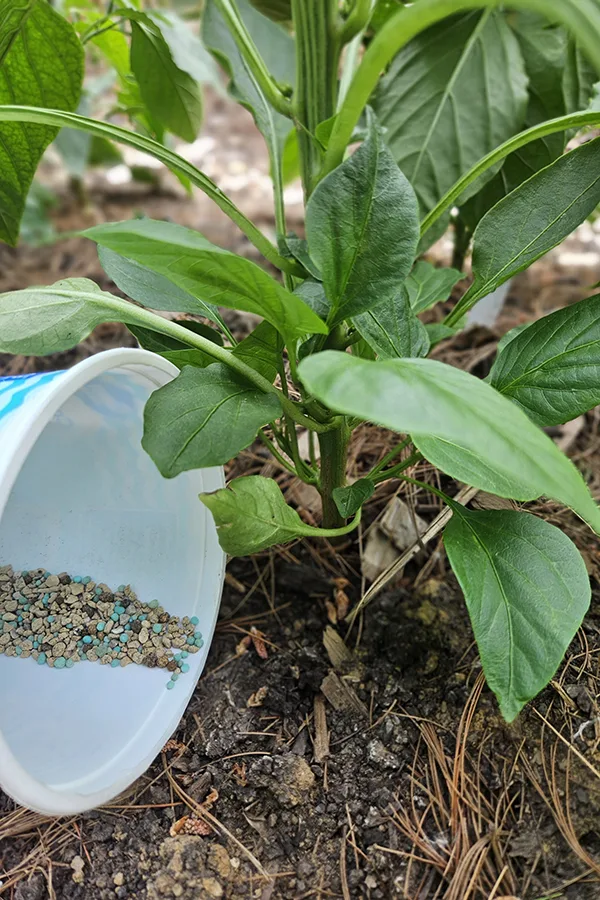The Ultimate Overview to Feeding Peppers: Enhancing Development and Taste Normally
As pepper fanatics seek to cultivate robust plants yielding tasty fruits, the function of fertilizing ends up being vital in accomplishing these goals. By checking out the benefits of all-natural fertilizers, opening the tricks behind pepper plant nutrient needs, and diving into the world of organic fertilizer alternatives, a globe of possibilities emerges for boosting the vigor and taste account of these cherished plants.
Benefits of Natural Plant Foods
Natural fertilizers use a range of benefits that contribute to the general health and productivity of pepper plants. By enhancing the dirt with natural matter, such as garden compost or manure, all-natural fertilizers enhance its water retention capability and nutrient-holding capabilities, producing an extra hospitable environment for pepper plants to prosper in.
Furthermore, all-natural fertilizers support a varied and energetic dirt microbiome, fostering valuable microbial task that aids in nutrient recycling and uptake by the plants. This microbial task can aid subdue harmful pathogens and diseases, minimizing the demand for chemical treatments. Furthermore, natural fertilizers advertise lasting soil health by maintaining a balanced ecological community underground, which subsequently sustains the overall health and strength of pepper plants over ground.
Comprehending Pepper Plant Nutrient Requirements
Having established the advantages of natural fertilizers in improving soil health and advertising microbial task, the focus now shifts to understanding the details nutrient needs important for ideal growth and flavor in pepper plants.

Comprehending the particular nutrient needs of pepper plants is crucial for accomplishing bountiful harvests with superb flavor. By giving the best equilibrium of nutrients with natural fertilizers or dirt amendments, cultivators can ensure healthy and balanced, vigorous plants that create tasty peppers throughout the expanding period.
Organic Fertilizer Options for Peppers
In improving the development and flavor of pepper plants, selecting the ideal organic plant foods is a crucial consideration. Organic fertilizers use a all-natural and lasting means to nurture pepper plants without introducing damaging chemicals to the dirt and setting.
Another efficient natural fertilizer for peppers is aged manure. Rich in phosphorus, potassium, and nitrogen, aged manure offers a well balanced nutrient mix that supports energetic growth and abundant fruit manufacturing (best fertilizers for peppers). It is important to make use of well-aged manure to avoid shedding the plants with excess ammonia
Fish emulsion is a fast-acting organic fertilizer that provides pepper plants with a fast boost of nutrients. Stemmed from fish waste, this plant food is high in nitrogen, making it especially valuable throughout the beginning of pepper plant development. Fish solution is simple to apply and is easily absorbed by the plants, promoting healthy and balanced vegetation and solid origin visite site advancement.
When selecting an organic plant food for peppers, take into consideration the particular nutrient requirements of your plants and go with alternatives that straighten with your gardening practices and worths.
Ideal Practices for Fertilizing Pepper Plant Kingdoms
Thinking about the importance of selecting appropriate natural fertilizers for pepper plants, carrying out finest practices for fertilizing is necessary to make sure optimal development and flavor development. Among the crucial best techniques for fertilizing pepper plants is to conduct a soil examination prior to using any kind of plant foods. This test will certainly aid establish the certain nutrient requirements of the soil and guide you in choosing the best type and amount of fertilizer. It is also vital to feed pepper plants at the ideal time, normally before planting and throughout key growth phases such as blooming and fruit advancement.
Another important method is to stay clear of over-fertilization, as this can bring about nutrient imbalances, stunted growth, or even plant damage (best fertilizers for peppers). Following recommended dosage instructions and not exceeding them is crucial for the total health of the pepper plants. Furthermore, integrating raw material into the soil with garden compost or mulching can aid enhance soil framework, water retention, and nutrient schedule, great post to read advertising much healthier pepper plants with boosted taste accounts. By sticking to these ideal techniques, you can effectively nurture your pepper plants and accomplish abundant harvests with remarkable taste and quality.
Troubleshooting Common Fertilizing Issues

pH inequality is one more problem that can affect nutrient uptake in pepper plants. Establishing a routine fertilizing schedule and adhering to recommended application prices can assist stop this problem and make sure healthy and balanced pepper plants throughout the growing season.
Conclusion
In final thought, making use of all-natural plant foods can considerably improve the growth and flavor of pepper plants. By comprehending the nutrient requirements of pepper plants and selecting organic fertilizer alternatives, garden enthusiasts can effectively promote healthy and balanced and strenuous growth. Complying with finest methods for fertilizing pepper plants and troubleshooting usual fertilizing problems can help make certain effective growing of peppers. In general, proper fertilization techniques are necessary for taking full advantage of the yield and quality of pepper plants.
By exploring the advantages of natural fertilizers, opening the keys behind pepper plant nutrient needs, and delving right into the world of organic plant food options, a globe of possibilities arises for enhancing the vigor and taste profile of these precious plants.Fish emulsion is a fast-acting natural fertilizer that provides pepper plants with a quick increase of nutrients. It is likewise essential to feed pepper plants at the best time, usually before growing and during key development phases such as flowering and fruit have a peek here growth.
By comprehending the nutrient demands of pepper plants and selecting natural plant food choices, gardeners can successfully promote healthy and balanced and energetic growth. Following ideal practices for feeding pepper plants and troubleshooting usual fertilizing concerns can assist ensure effective cultivation of peppers.